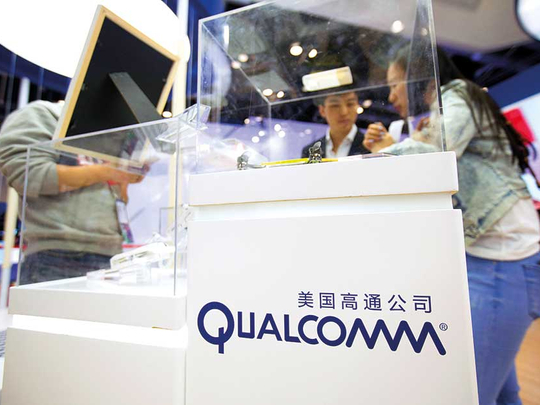
San Francisco
Qualcomm Inc rejected Broadcom Ltd’s $105 billion acquisition offer, kicking off what would be the largest technology takeover battle in history.
Qualcomm recommended shareholders spurn the deal, saying it’s an opportunistic move by Broadcom to buy the wireless-chip maker on the cheap. Qualcomm also said the transaction may face regulatory scrutiny that would cast doubt on its completion. A Broadcom representative didn’t immediately respond to a request for comment.
“It is the Board’s unanimous belief that Broadcom’s proposal significantly undervalues Qualcomm relative to the company’s leadership position in mobile technology and our future growth prospects,” said Paul Jacobs, executive chairman and chairman of the board of Qualcomm, in a statement.
Broadcom Chief Executive Officer Hock Tan on Nov. 6 offered $70 a share in cash and stock for Qualcomm, seeking to build a powerhouse that leads the market for wireless chips in devices like Apple Inc iPhones. Even before the rejection, Tan and his advisers were preparing to wage a proxy battle in which they appeal directly to Qualcomm investors.
“Qualcomm shareholders are likely to hold out for more, but we believe something in the $80-ish range is likely enough to bring most of them around,” Stacy Rasgon an analyst at Sanford C. Bernstein wrote in a note published over the weekend. Broadcom is unlikely to walk away given that there is significant headroom to find a deal acceptable to Qualcomm shareholders, he added.
Buying Qualcomm would reshape the chipmaking industry, transforming Broadcom into the third-largest semiconductor maker, behind Intel Corp and Samsung Electronics Co. The combined business would instantly become the default provider of a set of components needed to build each of the more than a billion smartphones sold every year. The deal would dwarf Dell Inc’s $67 billion acquisition of EMC in 2015 — then the biggest in the technology industry.
Tan, who has built Broadcom through a series of transactions that have helped reshape the $300 billion semiconductor industry, has previously been able to pull off deals with friendly approaches. Acquiring Qualcomm is further complicated by his target’s own push to close a more than $40 billion purchase of NXP Semiconductors NV. That purchase is being held up by regulatory approval. Tan said his offer for Qualcomm stands with or without Qualcomm’s acquisition of NXP.
For now, Qualcomm’s board is sticking with its management team, led by Chief Executive Officer Steve Mollenkopf.
“After a comprehensive review, conducted in consultation with our financial and legal advisers, the board has concluded that Broadcom’s proposal dramatically undervalues Qualcomm and comes with significant regulatory uncertainty,” said Tom Horton, the company’s presiding director, in the statement. “We are highly confident that the strategy Steve and his team are executing on provides far superior value to Qualcomm shareholders than the proposed offer.” Qualcomm stock, which rallied on the report of the offer, has traded below the bid price on scepticism that a transaction can be completed. The shares ended last week little changed this year at $64.57. That compares with a 50 per cent rally by Broadcom’s stock and a 44 per cent surge by the benchmark Philadelphia Stock Exchange Semiconductor Index.
On Monday, Qualcomm rose 1.3 per cent to $65.40 at 9:39am in New York.










